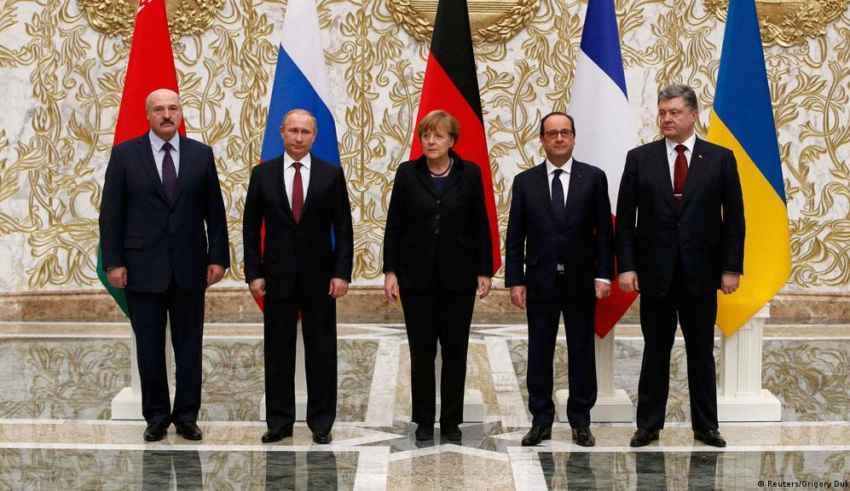
In February 2015, a rare summit of Russian, Ukrainian, German, and French leaders aimed to restore peace to parts of Ukraine taken over by pro-Russian rebels the year before. These territories became known as the Luhansk People’s Republic (LPR) and the Donetsk People’s Republic (DPR) in Ukraine’s Donbas region (DPR). The Ukrainian administration in Kyiv said that the two territories were practically captured by Russia. The discussions also attempted to work toward a regional political solution. The agreement, known as Minsk II, was signed by officials from Russia, Ukraine, separatist leaders, and the Organization for Security and Cooperation in Europe (OSCE). It was later reinforced by a UN Security Council resolution. The Minsk II Agreement has been the framework for subsequent attempts to end the war.
There were several problems with the agreement. It was created hastily in order to find common ground between two governments with diametrically opposed views on the matter. As a result, Minsk II turned out to be ambiguous and convoluted. Furthermore, it is critical to mention that the agreement did not contain the word “Russia” anywhere in the text. That pretense was problematic because it made Minsk II a one-sided letter of demand rather than an agreement.
Minsk II could be viewed in a variety of ways. There were deemed to be two interpretations of the agreement: Russian and Ukrainian. Russian version emphasized the importance of elections in DNR and LNR. In other words, Russia wanted Kyiv to completely surrender the authority to DNR and LNR before Ukraine would be allowed to regain control over its border. Russian interpretation was problematic for a number of reasons. First, it was likely in violation of Article 2 of the UN Charter that states, “All Members shall refrain in their international relations from the threat or use of force against the territorial integrity or political independence of any state…” Russia’s version of Minsk II seemed to be meant to bully Ukraine into giving up its sovereignty. Moreover, even if Russia’s conditions were followed, there was no guarantee in the agreement that Russia would allow Ukraine to re-establish control over its border. On the other hand, according to the Ukrainian interpretation of Minsk II, the re-establishment of control in the east should have come before a political settlement. Russia would withdraw its soldiers and reestablish the border with Ukraine. Then, elections would be held in accordance with OSCE/ODIHR guidelines. Finally, Donbas would be reintegrated into the national decentralization program and re-subordinated to Kyiv’s authority. That approach was controversial because it did not provide Eastern Ukraine separatists and Russia with any guarantees that Ukraine would entertain fair elections in DNR and LNR. It is clear that Minsk II was subject to several interpretations, and that made the agreement ineffective. Although Minsk II was not considered a treaty per se, the states could have applied the Vienna Convention on the Law of Treaties to the articles in question to attempt to interpret the agreement according to the international law. Moreover, it is possible that today’s events may have been avoided if the agreement had been presented before the ICJ to apply international law and equitably interpret it.
It is notable that, despite the fact that the whole international community understood that Moscow supported separatists in Eastern Ukraine, the drafters of the agreement neglected to impose any obligations on Russia. One explanation for such negligence might have been Russia’s denial of involvement in the conflict. Today, it is evident that Moscow was interested and heavily involved in the dispute. Another factor might have been the fear that Russia and the separatists would refuse to sign the accord and would continue the war. Despite that valid concern, drafters allowed themselves to be pushed around, giving Kremlin more confidence. That confidence, most certainly, played a role in Putin’s decision to launch military invasion of Ukraine. Nonetheless, it is possible that the events might well have taken a different course if the OSCE had applied greater pressure on Russia. It could be argued that this “mitigative” approach employed by Europe and the U.S is what led to today’s war. Mitigative approach aims to lessen the intensity of an adverse event’s manifestation as much as possible after it has occurred. The international community is presently imposing sanctions on Russia, but the economic consequences will likely take years to be seen. Moreover, the U.S and Europe are failing to take into account Russian people’s mentalities and the specific problems at hand. In order to achieve their goal, sanctions need to be less unilateral and should focus more on the nation’s mentality and particular objectives. The last several rounds of sanctions were more effective, but they came too late. Instead, if the world adhered to the “preventative” approach, it is possible that the situation in Ukraine would be different now. Preventative approach is one that aims to prevent unfavorable consequences by lowering the likelihood of their occurrence or severity. For instance, the Minsk II agreement should have been written in such a manner that it imposed obligations on Russia and contained potential repercussions in the event of noncompliance. If drafters did that, Putin would probably think twice before taking an action.
References
Lister, T. (2022, February 10). What is the Minsk Agreement and is it a way out of ukraine crisis? CNN. Retrieved May 15, 2022, from https://www.cnn.com/2022/02/09/europe/minsk-agreement-ukraine-russia-explainer-intl/index.html
Package of measures for the implementation of the Minsk agreements. OSCE. (n.d.). Retrieved May 15, 2022, from https://www.osce.org/cio/140156
Smith, N. (2022, February 23). What are the Minsk Agreements on the Ukraine conflict? NewsNation. Retrieved May 15, 2022, from https://www.newsnationnow.com/world/russia-at-war/why-didnt-minsk-peace-accords-help-stop-conflict/
By The European Institute for International Law and International Relations.















